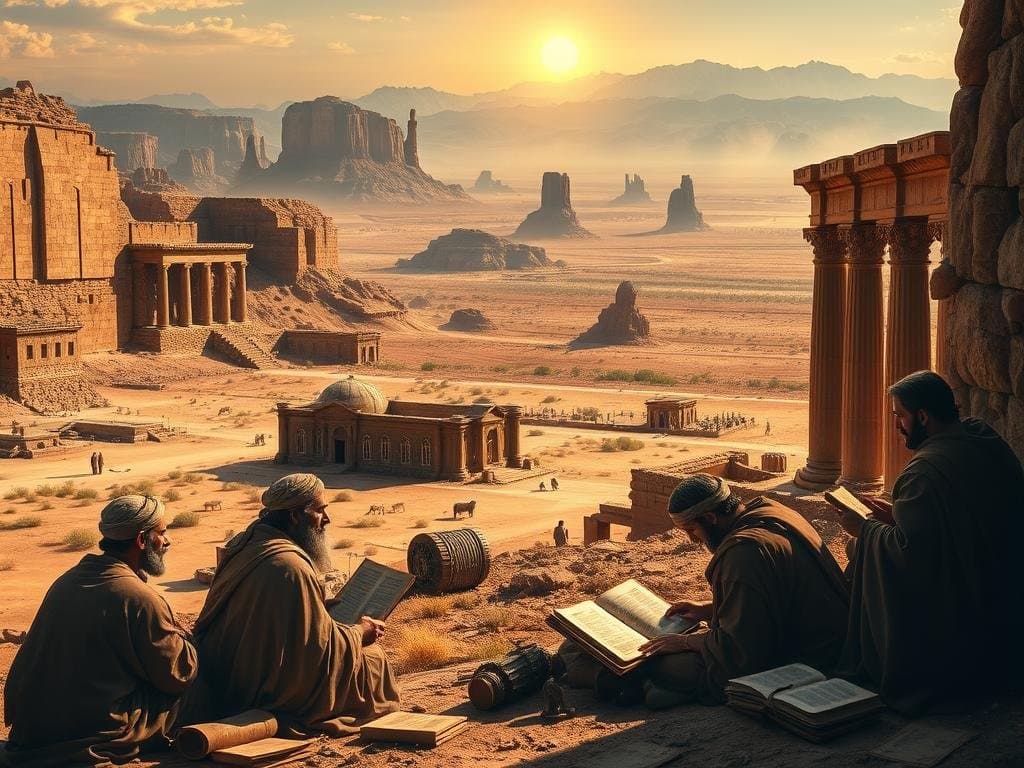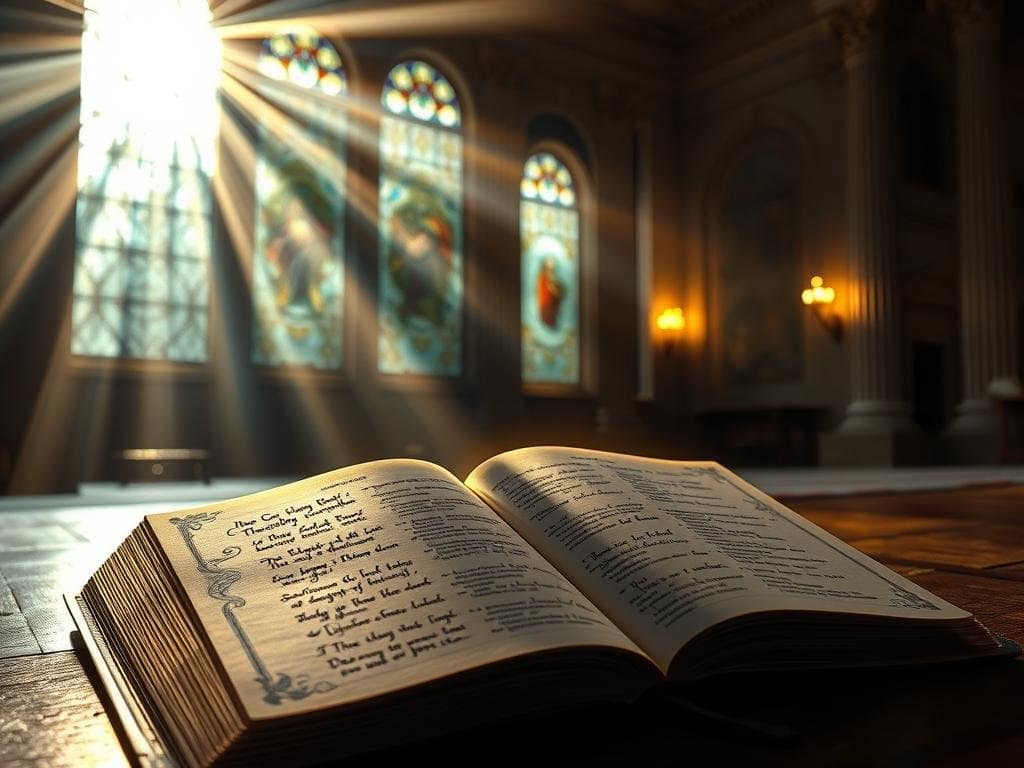Exploring Biblical Genesis: A Comprehensive Look at Creation and Faith
Exploring Biblical Genesis: Have you ever wondered about the origins of life and the world we live in?
The Book of Genesis offers a profound answer. As the first book of the Bible, it sets the stage for understanding faith, purpose, and the divine plan.
Its opening words, “In the beginning,” invite you to explore a story that has shaped millions of lives.
This ancient text is more than just a historical account. It’s a narrative of how God brought order from chaos, creating a world filled with beauty and goodness.
From the first breath of life to the intricate design of the universe, Genesis reveals the intentionality behind every moment in time.
At its core, the story of Genesis is about beginnings. It’s about the start of humanity, the birth of faith, and the promise of a divine relationship. Whether you’re new to this book or revisiting it, its timeless message continues to inspire and guide.
Join us as we delve into the themes of creation, life, and the profound meaning behind the words of Genesis. Let’s uncover the foundation of faith that has stood the test of time.
Understanding Genesis: Literary Structure and Theological Themes
Genesis is a book rich in literary design and theological depth. Its structure is divided into two main parts: chapters 1-11 and chapters 12-50. The first part focuses on the creation of the world and humanity, while the second part delves into the story of Abraham and his descendants. This division highlights the book’s dual focus on universal history and personal faith.
Narrative Framework and Style
The narrative style of Genesis is both poetic and straightforward. It uses repetition, such as the phrase “this is the account of,” to mark key transitions.
This technique helps readers follow the flow of the story. The poetic elements, like the creation account in chapter 1, add depth and beauty to the text.
Genesis also poses deep questions about divine purpose and human experience. For example, why does God choose Abraham? What is the plan behind the covenant? These questions invite readers to reflect on their own relationship with God.
Key Symbolism and Themes
Symbolism plays a significant role in Genesis. The use of numbers, like the seven days of creation, signifies completeness. The story of the flood in chapters 6-9 symbolizes both judgment and renewal. These symbols enrich the text and reveal its deeper meanings.
The themes of blessing and covenant are central to Genesis. God’s promise to Abraham in chapter 12 sets the stage for the rest of the book. This promise is not just for Abraham but for all nations, emphasizing the universal plan of God.
| Section | Chapters | Key Themes |
|---|---|---|
| Creation History | 1-11 | Creation, Fall, Flood |
| Patriarchal History | 12-50 | Covenant, Blessing, Promise |
Understanding these elements helps you appreciate Genesis as both literature and theology. It’s not just a book of history but a story of God’s plan for humanity. Each chapter builds on the last, creating a cohesive narrative that continues to inspire.
Historical and Cultural Context of Genesis
To truly grasp the depth of Genesis, you must step into its historical and cultural setting. This ancient text is rooted in the world of the Near East, a place where civilizations like Mesopotamia and Egypt thrived. These cultures shaped the stories and themes you find in Genesis.
The concept of land is central to the narrative. It’s not just physical territory but a symbol of promise and belonging. For example, the land promised to Abraham becomes a key theme throughout the book. This idea reflects the importance of territory in ancient societies.

Time also plays a crucial role. The stories in Genesis are set in a specific era, giving them historical weight. Understanding this time helps you see how the text addresses the concerns of its original audience. It connects the past to the present, showing how these stories still matter today.
Humanity, represented by man and person, is at the heart of Genesis. The text explores the role of people in creation and early civilization. It asks questions about purpose, responsibility, and relationship with the divine. These themes resonate across cultures and time.
The earth is both a physical and symbolic realm in Genesis. It’s the stage for creation, the flood, and the covenant. This duality adds depth to the narrative, showing how the physical world reflects spiritual truths.
By understanding this context, you gain a richer appreciation for Genesis. It’s not just an ancient text but a story that continues to shape faith and culture. Its themes of land, time, and humanity remain relevant, offering timeless insights into the human experience.
Creation: The Beginning of Order and Beauty
From chaos to order, the creation account in Genesis reveals a masterful design. In six active days, God brought life and beauty into existence, culminating in a day of rest. This story is not just about the origins of the world but also about the intentionality behind every detail.
The Seven Days of Creation
The creation narrative begins with light, separating it from darkness. Each day builds on the last, showing a deliberate progression. On the first day, light was created, symbolizing life and goodness. The second day saw the separation of waters, creating the sky.
On the third day, dry land emerged, and vegetation flourished. The fourth day introduced the sun, moon, and stars to mark seasons, days, and years. The fifth day brought sea creatures and birds, while the sixth day saw the creation of land animals and humans.
The seventh day was set apart as a day of rest, signifying completion. This rhythm of work and rest reflects divine wisdom and intentionality. Each step in the creation process highlights God’s power to bring order from chaos.
Humans Made in God’s Image
The creation of Adam and Eve marks a unique moment in the narrative. Formed in God’s image, they were given the responsibility to steward the earth. This reflects their special role in creation and their relationship with the divine.
The garden of Eden, a fertile and beautiful land, was their home. It symbolized God’s provision and the harmony of creation. The gift of this garden underscores the trust placed in humanity to care for the world.
Being made in God’s image also means reflecting His character. This includes creativity, love, and the ability to form relationships. The story of Adam and Eve invites you to see yourself as part of this divine plan.
| Day | Creation | Significance |
|---|---|---|
| 1 | Light | Separates light from darkness |
| 2 | Sky | Divides waters above and below |
| 3 | Land and Vegetation | Prepares for life |
| 4 | Sun, Moon, Stars | Marks time and seasons |
| 5 | Sea Creatures and Birds | Fills the waters and skies |
| 6 | Land Animals and Humans | Completes creation |
| 7 | Rest | Signifies completion |
To learn more about the theological significance of creation, visit this insightful resource.
The Fall: Humanity’s Choice and Its Consequences
The story of the Fall is a turning point in human history, marking the moment when sin entered the world. Adam and Eve’s disobedience in the garden brought profound changes, altering humanity’s relationship with God and introducing lasting consequences.

Their choice to eat the forbidden fruit wasn’t just an act of rebellion; it was the beginning of a broken covenant. This moment shattered the harmony between humanity and the divine, leading to separation and spiritual death.
Impact on Relationships and Divine Judgment
The Fall didn’t just affect Adam and Eve; it changed the dynamics between man and woman. What was once a perfect partnership became marked by struggle and tension. Their relationship with God also suffered, as they hid from His presence in shame.
This act of disobedience brought divine judgment. Pain, toil, and hardship became part of life. Yet, even in this moment of judgment, there was a glimmer of hope. God’s promise of redemption through the offspring of the woman pointed to a future restoration.
The Fall reminds us of the weight of our choices. It shows how sin disrupts our relationship with God and others. But it also highlights God’s grace, offering a path to redemption despite our failures.
To dive deeper into the consequences of the Fall, explore this insightful resource on its lasting impact.
The Flood: Divine Judgment and New Beginnings
The story of Noah’s Ark is one of the most dramatic accounts in the Bible. It’s a tale of divine judgment and mercy, where the flood serves as a turning point in human history. This event not only highlights God’s response to widespread corruption but also offers a message of hope and renewal.
Noah’s Ark and the Great Deluge
When humanity’s wickedness reached its peak, God chose Noah to build an ark. This massive vessel would save Noah’s family and pairs of every animal species. The ark became a symbol of God’s protection for those who remained faithful.
The flood itself was catastrophic, covering the entire earth for over a year. It was a de-creation event, returning the world to its chaotic, watery state. Yet, even in this judgment, there was a plan for restoration.
“Everything on earth will perish. But I will establish my covenant with you, and you will enter the ark—you and your sons and your wife and your sons’ wives with you.” — Genesis 6:17-18
The Covenant of the Rainbow
After the waters receded, God made a covenant with Noah, symbolized by the rainbow. This promise marked a new beginning for humanity, ensuring that such a flood would never occur again. The rainbow became a sign of God’s mercy and faithfulness.
This covenant echoes the harmony of the garden Eden, reminding us of God’s original plan for creation. It’s a reminder that even in judgment, there is always hope for renewal.
| Event | Significance |
|---|---|
| Building the Ark | Preservation of Noah’s family and creation |
| The Flood | Divine judgment on widespread corruption |
| The Rainbow Covenant | Promise of mercy and new beginnings |
The story of the flood is both a warning and a promise. It shows the consequences of sin but also God’s unwavering commitment to His creation. Through Noah’s obedience, we see the power of faith in the face of overwhelming challenges.
Exploring Biblical Genesis in the Context of Faith
The narrative of Genesis is deeply rooted in themes of hope and divine purpose. From the very beginning, it weaves a story of God’s unwavering commitment to humanity, even in the face of human failings. At its heart, Genesis is a testament to the enduring power of divine promises that point toward redemption.

Scriptural Promises and Redemptive Themes
Throughout Genesis, God’s promise of salvation shines as a beacon of hope. From the covenant with Noah to the assurance given to Abraham, these promises remind us of God’s faithfulness. They serve as milestones in the narrative, marking moments of divine intervention and guidance.
The concept of day plays a significant role in Genesis. Each day of creation reflects a step in God’s plan to bring order and beauty to the world. The seventh day, a day of rest, symbolizes completion and invites us to trust in God’s timing and purpose.
God’s word is transformative, renewing faith even in the midst of adversity. In Genesis, His word brings life, order, and hope. It’s a reminder that His plans are always for our good, even when we can’t see the bigger picture.
These themes offer a lens to understand divine consistency throughout history. They invite you to reflect on your own journey of faith and see how God’s promises are still at work in your life today.
The Patriarchs: Abraham, Isaac, Jacob, and Joseph
The lives of the patriarchs reveal profound lessons about faith, family, and divine purpose. These men—Abraham, Isaac, Jacob, and Joseph—played pivotal roles in shaping biblical history. Their stories are filled with trials, triumphs, and the unwavering faithfulness of God.
Abraham’s Covenant and Legacy
Abraham’s journey began with a divine call. God promised to make his name great and bless all nations through him. This covenant marked the beginning of a special relationship between God and Abraham’s family.
Abraham’s faith was tested when God asked him to sacrifice his son, Isaac. Yet, he trusted God’s plan, showing his unwavering devotion. This act of faith solidified his legacy as the father of many nations.
Jacob’s Journey and Transformation
Jacob’s story is one of transformation. Known for his cunning, he deceived his brother, Esau, to gain his birthright. Yet, God had a greater plan for Jacob. After wrestling with an angel, he received a new name: Israel, meaning “he struggles with God.”
Jacob’s life was marked by challenges, including conflicts with his brothers and struggles within his family. Yet, through it all, God remained faithful, shaping Jacob into a man of faith.
Joseph’s Story of Redemption
Joseph’s journey is a testament to God’s providence. Sold into slavery by his brothers, he faced betrayal and hardship. Yet, even in prison, God was with him, elevating him to a position of power in Egypt.
Joseph’s story highlights forgiveness and redemption. When his brothers came to Egypt seeking food, he forgave them, saying, “You intended to harm me, but God intended it for good.” This act of reconciliation restored his family and fulfilled God’s plan.
Through their lives, the patriarchs teach us about faith, perseverance, and God’s faithfulness. Their stories remind us that even in our struggles, God is working for our good.
Faith, Covenant, and the Promise of Blessing
God’s covenant with Abraham reshaped the course of history. It wasn’t just a promise to one man but a plan to bless entire nations. This divine agreement set the stage for a legacy of faith that continues to inspire believers today.
God’s Everlasting Covenant Across Generations
The concept of a covenant is central to the story of Abraham. God promised to make him the father of many nations, ensuring his descendants would be as numerous as the stars. This promise wasn’t just for Abraham but for all who would follow in his footsteps.
Through Abraham’s family, God’s blessings flowed to future generations. Isaac, Jacob, and Joseph each carried this legacy forward. Their lives show how God’s promise of provision and protection remains steadfast, even in times of trial.
This covenant wasn’t limited to one family. It extended to entire nations, offering hope and redemption to all. God’s role as a father to His people is evident in His care and guidance throughout their journey.
| Patriarch | Key Promise | Impact |
|---|---|---|
| Abraham | Father of many nations | Established God’s covenant |
| Isaac | Continuation of the promise | Strengthened the lineage |
| Jacob | Blessing of the twelve tribes | Expanded the family legacy |
| Joseph | Preservation of the family | Fulfilled God’s plan in Egypt |
These enduring promises form the cornerstone of faith. They remind us that God’s plans are always for our good, even when we can’t see the bigger picture. Through Abraham’s story, we learn to trust in God’s faithfulness, knowing His blessings extend to us today.
Applying Genesis’ Lessons to Your Spiritual Journey
The timeless lessons of Genesis continue to shape lives today, offering guidance for your spiritual path. This ancient text isn’t just a historical account; it’s a source of wisdom for navigating modern challenges. By reflecting on its themes, you can find practical ways to deepen your faith and strengthen your relationship with God.
Modern Relevance and Personal Reflection
Genesis teaches us about the importance of faith, obedience, and trust. These lessons are as relevant now as they were thousands of years ago. For example, the stories of the patriarchs show how God works through ordinary people to fulfill His plans. Their experiences remind us that even in difficult times, God is with us.
One practical thing you can learn from Genesis is the value of perseverance. Abraham’s journey wasn’t easy, but he trusted God’s promises. His story encourages you to stay faithful, even when the way forward seems unclear.
“Trust in the Lord with all your heart and lean not on your own understanding.” — Proverbs 3:5
Maintaining a healthy relationship with God is another key takeaway. The narrative highlights the consequences of disobedience but also the blessings of faithfulness. This balance reminds you to seek God in every part of your life.
Practical Lessons for Everyday Life
Genesis also offers insights into making wise decisions. Joseph’s story, for instance, shows how integrity and forgiveness can lead to redemption. His life teaches you to trust God’s timing, even when circumstances seem unfair.
Another important thing to consider is the role of community. The patriarchs relied on their family and faith to overcome challenges. This reminds you to surround yourself with supportive people who share your values.
| Theme | Lesson |
|---|---|
| Faith | Trust in God’s plan, even when it’s unclear. |
| Obedience | Follow God’s guidance, even when it’s difficult. |
| Perseverance | Stay faithful through trials and challenges. |
| Forgiveness | Let go of bitterness and embrace reconciliation. |
Every part of Genesis—from creation to covenant—offers valuable lessons for your spiritual journey. By applying these teachings, you can align your life with God’s plan and experience His blessings in meaningful ways.
Conclusion
The narrative of Genesis offers timeless lessons that continue to shape faith and understanding. This book is more than a historical account; it’s a foundation for exploring God’s plan for humanity.
From the beginning of creation to the stories of the patriarchs, each chapter reveals profound truths about purpose and redemption.
At its core, Genesis is a story of relationships—between God and person, between brother and brother, and between humanity and the world.
These interactions highlight the significance of faith, obedience, and trust. Every place and moment in the narrative carries a deeper meaning, pointing to God’s unwavering love.
As you reflect on Genesis, consider its enduring relevance. The fact of creation, the trials of the patriarchs, and the promises of God all remind us of His faithfulness. This history invites you to see your own life as part of a greater plan, encouraging you to walk in faith and trust His purpose.
FAQ
What is the significance of the seven days of creation?
The seven days of creation in Genesis highlight God’s intentional design and order in the world. Each day builds on the last, showing how everything fits together in harmony.
Why is humanity described as made in God’s image?
Being made in God’s image means you reflect His character and purpose. It’s a reminder of your unique value and responsibility to care for creation and others.
What does the story of the Fall teach us about sin?
The Fall shows how sin disrupts relationships—with God, others, and creation. It reveals the consequences of disobedience but also sets the stage for God’s redemptive plan.
What is the meaning behind Noah’s Ark and the flood?
Noah’s Ark symbolizes God’s judgment on sin but also His mercy in preserving life. The flood story ends with the rainbow covenant, a promise of God’s faithfulness.
How does Abraham’s covenant impact the rest of the Bible?
Abraham’s covenant is foundational. It introduces the idea of God’s promise to bless all nations through his descendants, which points to Jesus in the New Testament.
What lessons can we learn from Joseph’s story?
Joseph’s story teaches about forgiveness, resilience, and God’s sovereignty. Even in difficult circumstances, God works things out for good.
How does Genesis connect to faith today?
Genesis lays the groundwork for understanding God’s character, His plan for humanity, and the importance of faith. Its themes of creation, sin, and redemption are still relevant today.
What is the importance of the rainbow covenant?
The rainbow covenant is a symbol of God’s promise never to destroy the earth with a flood again. It’s a reminder of His mercy and faithfulness.
How can I apply the lessons of Genesis to my life?
By reflecting on Genesis, you can see how God works in your life, the importance of obedience, and the hope found in His promises. It’s a guide for living with purpose and faith.







